Papers by Dr. Tuğba Demirtaş
Islamic banking is an alternative banking area with an asset volume of approximately 3 trillion d... more Islamic banking is an alternative banking area with an asset volume of approximately 3 trillion dollars today. Its working principles, products and services, balance sheet structure, and pricing behaviors differ from conventional banks. These differences are likely to be reflected in the factors that support the equity profitability of banks. For this reason, this study aims to find common components that support equity profitability through Islamic banking data from 14 countries. The study uses the Dupont method to examine the effectiveness of operational efficiency, asset efficiency, and leverage factors on the profitability of countries. The results show that the different structures of Islamic banks affect the factors supporting profitability performance in the same way across countries.
Islamic banking, or, in its broader definition, Islamic finance, is a sector gradually developing... more Islamic banking, or, in its broader definition, Islamic finance, is a sector gradually developing as an application area of alternative finance. This study explains the basic principles of Islamic banking, historical development globally, and leading products and services. The primary aim of this paper is to analyze the distribution of products and services. The study includes 18 countries' product distribution and preferences. The results show that the sector prefers intensively less risky areas (murabahah, ijarah) despite the increasingly developing and diversified products and services. While this attitude increases the sector's resilience, it also shows that the methods (musharakah, mudarabah, etc.) by which resources are transferred to production, investmet and the real economy must be developed.
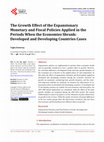
Theoretical economics letters, 2024
Expansionary policies are implemented in periods when economies shrink and are generally consider... more Expansionary policies are implemented in periods when economies shrink and are generally considered to have a positive effect on growth. However, the structural differences, development levels and basic growth dynamics of the economies are as decisive as the applied policy set and composition. In this study, the effects of expansionary monetary and fiscal policies applied in developed and developing countries during the economic recession on growth are examined, considering basic growth dynamics, and the shortand long-term outlooks are analyzed. To measure the effectiveness of expansionary policy in developed and developing countries, 55 developed and 55 developing countries are studied. For each monetary and fiscal policy, the 2007-2009 period applications are considered, while the effects of the main growth variables are examined during the 2007-2016 period. The system GMM method is used in the panel to see the reflections of policy effectiveness on growth in the 10 years. While the results reveal how structural differences in the two country groups affect the effectiveness of policies, they also show that monetary and fiscal policies have different effects on growth.
American Journal of Industrial and Business Management, 2024
Whether monetary policies implemented in contracting periods are pro-growth and in what situation... more Whether monetary policies implemented in contracting periods are pro-growth and in what situations they will be effective is a matter of debate. However, especially during and after the 2008 crisis, policy sets have become increasingly diversified, and not only traditional but also non-traditional policies have begun to be used extensively. In this study, answers to the effectiveness of monetary policy on global growth were sought both at the theoretical level and the policies examined with extensive country examples. Although policies have diversified in the final view, the effectiveness of the harmony in monetary policies on global growth can be seen in these periods.
Modern Economy, Dec 31, 2022
It is controversial at the global level whether the expansionary fiscal policies implemented duri... more It is controversial at the global level whether the expansionary fiscal policies implemented during the economic contraction are pro-growth. Reaching conclusions on discussion points is possible by observing theory and practice. While this study examines policies between 2007 and 2009 with examples from developed and developing countries, it also includes different approaches to the ideal policy set in the literature. In the light of discussions in the literature, the harmony between countries' fiscal policies and their implementation areas also reveals their effectiveness in global growth.
Turk Turizm Arastirmalari Dergisi
There are many different opinions in the literature that expansionary fiscal policies can be effe... more There are many different opinions in the literature that expansionary fiscal policies can be effective on growth during periods of economic contraction. In this study, different approaches to expansionary fiscal policies are examined in terms of the effects and tradeoffsbetween fiscal expenditures-growth, expansionary tax policies-growth and inflation-growth. The short-term and long-term effects of fiscal policies on growth in 110 countries for the period of 2007-2016 were analyzed, taking into account the expansionary policies of the 2007-2009 period, the effect of the main growth dynamics and the interaction of monetary-fiscal policies. The results show the holistic view and effectiveness.
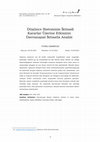
Economics Literature
Each individual forming the society is far from mathematical models; Considering that it exists u... more Each individual forming the society is far from mathematical models; Considering that it exists under the influence of a number of sociological, psychological, cultural or anthropological factors; The decision-making process of the individuals who make up the dynamics of the economy and the balances they create are also becoming extremely important. On a plane where the economic cannot be separated from the society and the society's individual decision-making mechanism, the shortcuts of the individual thought system come to the fore. The concept of limited rationality has come to the fore after the more frequent crises, on a plane that the mainstream economics describes as "homoeconomicus" or "rational individual" under all circumstances and argues that there are individuals who make rational decisions. It has been revealed that individuals who make complete decisions, which the economy adapts only with models, are not actually like that. In this study, while...
Ankara Üniversitesi Sosyal Bilimler Dergisi, 2020
2008 krizinden günümüze geçen zamana rağmen etki alanının büyüklüğü ve küresel politikaları şekil... more 2008 krizinden günümüze geçen zamana rağmen etki alanının büyüklüğü ve küresel politikaları şekillendirmesi sebebiyle önemini hala korumaktadır. Krizin oluş şekli, başlamasına sebep olan unsurlar, alınan tedbirler ve çıkış stratejileri ne ilktir ne son görülmektedir. Nitekim geçmişten günümüze yaşanan krizler silsilesi de incelendiğinde bu tablonun kendini tekrar ettiği de gün yüzüne çıkmaktadır. Bu çalışmada 2008 krizi etrafında nedenleri sorgulanacak ve bu nedenlerin çözümleri para ve maliye politikası ekseninde değerlendirilecektir.
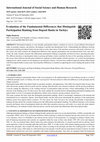
Participation banking, or, more broadly, participation finance, continues to exist as a sector di... more Participation banking, or, more broadly, participation finance, continues to exist as a sector different from deposit banks in principle, purpose, and practice, developing at national and international levels. Understanding the difference between participation banking and deposit banks also provides accurate observation of the operation, processes, and results reflections. For this reason, this study examines the fundamental differences that separate participation and conventional banks from each other. Firstly, the study includes elements that differentiate participation banking conceptually and based on basic operating principles. The different structures of participation banks in pricing and balance sheets constitute the basis of the operating mechanism. For this reason, fund collection and allocation methods are explained in detail together with this structure. As a result, the participation banking sector, which continues its development as an alternative finance, was born from a different approach and has differentiated itself from deposit banks in many areas. Knowing these differences is essential in supporting the correct reading and analysis of the sector.
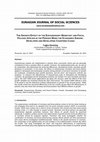
Expansionary policies are implemented in periods when economies shrink and are generally consider... more Expansionary policies are implemented in periods when economies shrink and are generally considered to have a positive effect on growth. However, the implemented policy set, as well as its composition, also determines the structural differences, development levels, and basic growth dynamics of economies. In this study, the effects of expansionary monetary and fiscal policies applied in developed and developing countries during periods of economic recession on growth are examined, considering basic growth dynamics, and the short-and long-term outlooks are analyzed. To measure the effectiveness of expansionary policy in developed and developing countries, 55 developed and 55 developing countries are studied. For each monetary and fiscal policy, the 2007-2009 period applications are taken into account, while the effects of the main growth variables are examined during the 2007-2016 period. The system GMM method is used in the panel to see the reflections of policy effectiveness on growth in the 10-year period. While the results reveal how structural differences in the two country groups affect the effectiveness of policies, they also show that monetary and fiscal policies have different effects on growth.
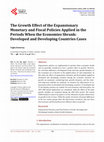
Expansionary policies are implemented in periods when economies shrink and are generally consider... more Expansionary policies are implemented in periods when economies shrink and are generally considered to have a positive effect on growth. However, the implemented policy set, as well as its composition, also determines the structural differences, development levels, and basic growth dynamics of economies. In this study, the effects of expansionary monetary and fiscal policies applied in developed and developing countries during periods of economic recession on growth are examined, considering basic growth dynamics, and the short- and long-term outlooks are analyzed. To measure the effectiveness of expansionary policy in developed and developing countries, 55 developed and 55 developing countries are studied. For each monetary and fiscal policy, the 2007-2009 period applications are taken into account, while the effects of the main growth variables are examined during the 2007-2016 period. The system GMM method is used
in the panel to see the reflections of policy effectiveness on growth in the 10-year period. While the results reveal how structural differences in the two country groups affect the effectiveness of policies, they also show that monetary and fiscal policies have different effects on growth."
"There are many different opinions in the literature that expansionary fiscal policies can be eff... more "There are many different opinions in the literature that expansionary fiscal policies can be effective on growth during periods of economic contraction. In this study, different approaches to expansionary fiscal policies are examined in terms of the effects and tradeoffs between fiscal expenditures-growth, expansionary tax policies-growth and inflation-growth. The short-term and long-term effects of fiscal policies on growth in 110 countries for the period of 2007-2016 were analyzed, taking into account the expansionary policies of the 2007-2009 period, the effect of the main growth dynamics and the interaction of monetary-fiscal policies. The results show the holistic view and effectiveness.
There are many different opinions in the literature that expansionary fiscal policies can be effe... more There are many different opinions in the literature that expansionary fiscal policies can be effective on growth during periods of economic contraction. In this study, different approaches to expansionary fiscal policies are examined in terms of the effects and tradeoffs between fiscal expenditures-growth, expansionary tax policies-growth and inflation-growth. The short-term and long-term effects of fiscal policies on growth in 110 countries for the period of 2007-2016 were analyzed, taking into account the expansionary policies of the 2007-2009 period, the effect of the main growth dynamics and the interaction of monetary-fiscal policies. The results show the holistic view and effectiveness.
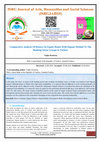
In this study, the return on equity of the banking groups that constitute the banking sector in ... more In this study, the return on equity of the banking groups that constitute the banking sector in Turkiye was examined with Dupont
analysis. Although banks in Turkiye have high equity profitability, it is expected that the differences in the working principles of
each bank group will be reflected in their comparative advantages. Dupont analysis is a method that allows the separation of the
components of profitability, as it shows the return on equity by also separating operational efficiency, asset efficiency, and leverage
ratios. For this reason, this study includes a detailed analysis of the return on equity of deposit banks, participation banks, and
development and investment banks that constitute the sector in the last five years. The results show that the differences in working
principles are also reflected in the comparative advantages in the components that constitute profitability.
Whether monetary policies implemented in contracting periods are pro-growth and in what situation... more Whether monetary policies implemented in contracting periods are pro-growth and in what situations they will be effective is a matter of debate. However, especially during and after the 2008 crisis, policy sets have become increa�singly diversified, and not only traditional but also non-traditional policies have begun to be used extensively. In this study, answers to the effectiveness of monetary policy on global growth were sought both at the theoretical level and the policies examined with extensive country examples. Although poli�cies have diversified in the final view, the effectiveness of the harmony in monetary policies on global growth can be seen in these periods.
We cannot consider the current state of banking and central banking without the formation of mone... more We cannot consider the current state of banking and central banking without the formation of money and the development of monetary policy without the discussions and ideas in this historical process. For this reason, this study examined the path of money from a historical perspective with the development of central banking and monetary policy. This period also revealed two different views on the effectiveness of monetary policy under the concepts of endogeneity and exogeneity. This study evaluates the effectiveness of monetary policies from a two-way perspective and the change in the historical period.
It is controversial at the global level whether the expansionary fiscal policies implemented duri... more It is controversial at the global level whether the expansionary fiscal policies implemented during the economic contraction are pro-growth. Reaching conclusions on discussion points is possible by observing theory and practice. While this study examines policies between 2007 and 2009 with examples from developed and developing countries, it also includes different approaches to the ideal policy set in the literature. In the light of discussions in the literature, the harmony between countries' fiscal policies and their implementation areas also reveals their effectiveness in global growth.
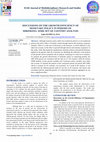
Although monetary policy shifts from traditional policies to non-traditional policies, the policy... more Although monetary policy shifts from traditional policies to non-traditional policies, the policy effect is basically created through interest and monetary expansion channels. There is a wide area of discussion in the literature, in which inflation is also taken into account, on the effect on growth through interest and monetary expansion. In this study, while discussing the expansionary monetary policies and growth efficiency
applied in the periods when the economies are shrinking, the reflection of the policies on the growth will be examined with an analysis consisting of a wide set of countries. To measure the growth effectiveness of monetary policy in contracting periods, the
2007-2016 period was examined with the data set of 110 countries. With the System GMM method, 4 basic growth variables and 4 monetary policy variables were taken into account. To measure the policies of the contraction period, the period 2007-2009, which is common for all countries, was examined. As a result of the analysis, it was revealed that the inflation-growth trade-off was less in all countries, and interest and investment policies supported growth. It is observed that monetary aggregates do not have a significant effect.
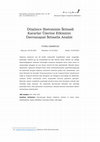
Toplumu oluşturan her bir ferdin matematik modellerden uzak; sosyolojik, psikolojik, kültürel ya ... more Toplumu oluşturan her bir ferdin matematik modellerden uzak; sosyolojik, psikolojik, kültürel ya da antropolojik bir dizi etkenin etkisi altında var olduğu düşünüldüğünde; iktisadın dinamiğini oluşturan bireylerin karar alma süreci ve oluşturduğu dengeler de son derece önemli bir hale gelmektedir. İktisadi olanın toplumdan, toplumun bireysel karar alma mekanizmasından ayrıştırılamayacağı bir düzlemde bireysel düşünce sisteminin kestirme yolları öne çıkmaktadır. Ana
akım iktisadın her koşulda “homoeconomicus” ya da “rasyonel birey” olarak tasvir ettiği ve rasyonel kararlar alan bireylerin var olduğunu savunduğu bir düzlemde, sıklaşan krizler sonrasında sınırlı rasyonalite kavramı gündeme gelmiştir. İktisadın sadece modellerle uyarladığı eksiksiz karar alan bireylerin aslında öyle olmadığı açığa çıkmıştır. Bu çalışmada davranışsal iktisadın öne çıkardığı psikolojik karar alma yöntemleri incelenirken, iktisadi kararlar üzerindeki etkileri tartışılmaya çalışılacaktır.

In spite of the passing time since the 2008 crises, it is still protect its importance with the s... more In spite of the passing time since the 2008 crises, it is still protect its importance with the sphere of infuence area and its potetial of the shaping current policies. It is well known that this crise with its occurance, reasons, cautions and exit strategies is not the rst one or the last. Thus, when all the crises analyzed from now to before repeating picture of the crises comes to scene. In this study, reasons of the 2008 crises is searched and fiscal and monetary policies critisized within this perpective.
2008 krizinden günümüze geçen zamana rağmen etki alanının büyüklüğü ve küresel politikaları şekillendirmesi sebebiyle önemini hala korumaktadır. Krizin oluş şekli, başlamasına sebep olan unsurlar, alınan tedbirler ve çıkış stratejileri ne ilktir ne son görülmektedir. Nitekim geçmişten günümüze yaşanan krizler silsilesi de incelendiğinde bu tablonun kendini tekrar ettiği de gün yüzüne çıkmaktadır. Bu çalışmada 2008 krizi etrafında nedenleri sorgulanacak ve bu nedenlerin çözümleri para ve maliye politikası ekseninde değerlendirilecektir.











Uploads
Papers by Dr. Tuğba Demirtaş
in the panel to see the reflections of policy effectiveness on growth in the 10-year period. While the results reveal how structural differences in the two country groups affect the effectiveness of policies, they also show that monetary and fiscal policies have different effects on growth."
analysis. Although banks in Turkiye have high equity profitability, it is expected that the differences in the working principles of
each bank group will be reflected in their comparative advantages. Dupont analysis is a method that allows the separation of the
components of profitability, as it shows the return on equity by also separating operational efficiency, asset efficiency, and leverage
ratios. For this reason, this study includes a detailed analysis of the return on equity of deposit banks, participation banks, and
development and investment banks that constitute the sector in the last five years. The results show that the differences in working
principles are also reflected in the comparative advantages in the components that constitute profitability.
applied in the periods when the economies are shrinking, the reflection of the policies on the growth will be examined with an analysis consisting of a wide set of countries. To measure the growth effectiveness of monetary policy in contracting periods, the
2007-2016 period was examined with the data set of 110 countries. With the System GMM method, 4 basic growth variables and 4 monetary policy variables were taken into account. To measure the policies of the contraction period, the period 2007-2009, which is common for all countries, was examined. As a result of the analysis, it was revealed that the inflation-growth trade-off was less in all countries, and interest and investment policies supported growth. It is observed that monetary aggregates do not have a significant effect.
akım iktisadın her koşulda “homoeconomicus” ya da “rasyonel birey” olarak tasvir ettiği ve rasyonel kararlar alan bireylerin var olduğunu savunduğu bir düzlemde, sıklaşan krizler sonrasında sınırlı rasyonalite kavramı gündeme gelmiştir. İktisadın sadece modellerle uyarladığı eksiksiz karar alan bireylerin aslında öyle olmadığı açığa çıkmıştır. Bu çalışmada davranışsal iktisadın öne çıkardığı psikolojik karar alma yöntemleri incelenirken, iktisadi kararlar üzerindeki etkileri tartışılmaya çalışılacaktır.
2008 krizinden günümüze geçen zamana rağmen etki alanının büyüklüğü ve küresel politikaları şekillendirmesi sebebiyle önemini hala korumaktadır. Krizin oluş şekli, başlamasına sebep olan unsurlar, alınan tedbirler ve çıkış stratejileri ne ilktir ne son görülmektedir. Nitekim geçmişten günümüze yaşanan krizler silsilesi de incelendiğinde bu tablonun kendini tekrar ettiği de gün yüzüne çıkmaktadır. Bu çalışmada 2008 krizi etrafında nedenleri sorgulanacak ve bu nedenlerin çözümleri para ve maliye politikası ekseninde değerlendirilecektir.
in the panel to see the reflections of policy effectiveness on growth in the 10-year period. While the results reveal how structural differences in the two country groups affect the effectiveness of policies, they also show that monetary and fiscal policies have different effects on growth."
analysis. Although banks in Turkiye have high equity profitability, it is expected that the differences in the working principles of
each bank group will be reflected in their comparative advantages. Dupont analysis is a method that allows the separation of the
components of profitability, as it shows the return on equity by also separating operational efficiency, asset efficiency, and leverage
ratios. For this reason, this study includes a detailed analysis of the return on equity of deposit banks, participation banks, and
development and investment banks that constitute the sector in the last five years. The results show that the differences in working
principles are also reflected in the comparative advantages in the components that constitute profitability.
applied in the periods when the economies are shrinking, the reflection of the policies on the growth will be examined with an analysis consisting of a wide set of countries. To measure the growth effectiveness of monetary policy in contracting periods, the
2007-2016 period was examined with the data set of 110 countries. With the System GMM method, 4 basic growth variables and 4 monetary policy variables were taken into account. To measure the policies of the contraction period, the period 2007-2009, which is common for all countries, was examined. As a result of the analysis, it was revealed that the inflation-growth trade-off was less in all countries, and interest and investment policies supported growth. It is observed that monetary aggregates do not have a significant effect.
akım iktisadın her koşulda “homoeconomicus” ya da “rasyonel birey” olarak tasvir ettiği ve rasyonel kararlar alan bireylerin var olduğunu savunduğu bir düzlemde, sıklaşan krizler sonrasında sınırlı rasyonalite kavramı gündeme gelmiştir. İktisadın sadece modellerle uyarladığı eksiksiz karar alan bireylerin aslında öyle olmadığı açığa çıkmıştır. Bu çalışmada davranışsal iktisadın öne çıkardığı psikolojik karar alma yöntemleri incelenirken, iktisadi kararlar üzerindeki etkileri tartışılmaya çalışılacaktır.
2008 krizinden günümüze geçen zamana rağmen etki alanının büyüklüğü ve küresel politikaları şekillendirmesi sebebiyle önemini hala korumaktadır. Krizin oluş şekli, başlamasına sebep olan unsurlar, alınan tedbirler ve çıkış stratejileri ne ilktir ne son görülmektedir. Nitekim geçmişten günümüze yaşanan krizler silsilesi de incelendiğinde bu tablonun kendini tekrar ettiği de gün yüzüne çıkmaktadır. Bu çalışmada 2008 krizi etrafında nedenleri sorgulanacak ve bu nedenlerin çözümleri para ve maliye politikası ekseninde değerlendirilecektir.
Keywords: Expansionary fiscal policy monetary policy growth shrinking period
This study examined the expansionary monetary policies implemented in countries when economies shrank and analyzed new methods, similarities, and differences. Thus, while observing the holistic picture, the effectiveness of global growth can be understood. How countries use policies, as well as policies, determines whether policies are expansionist or not. However, since the perspective on traditional monetary policy changed, especially after the 2008 crisis.